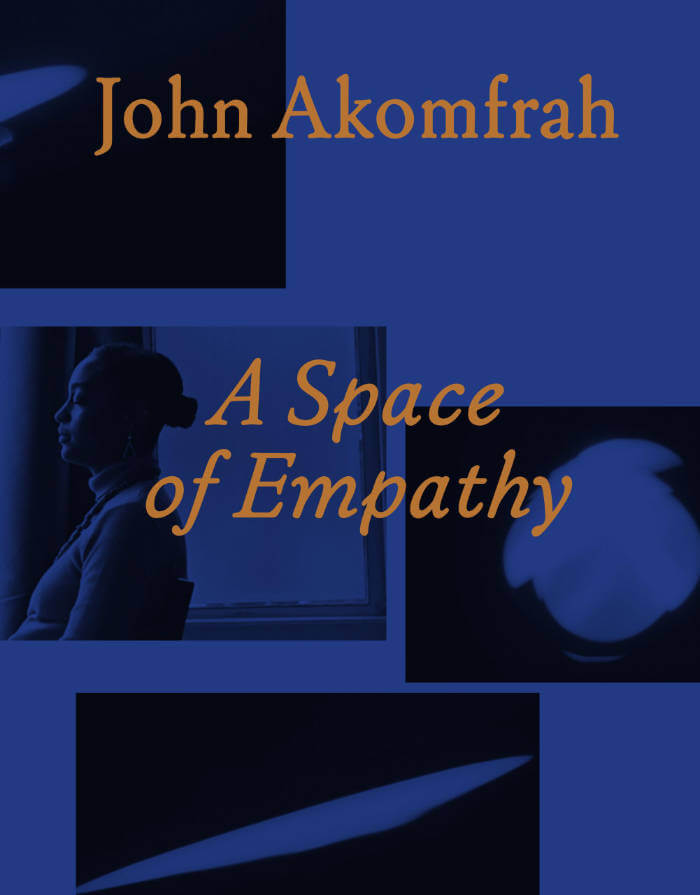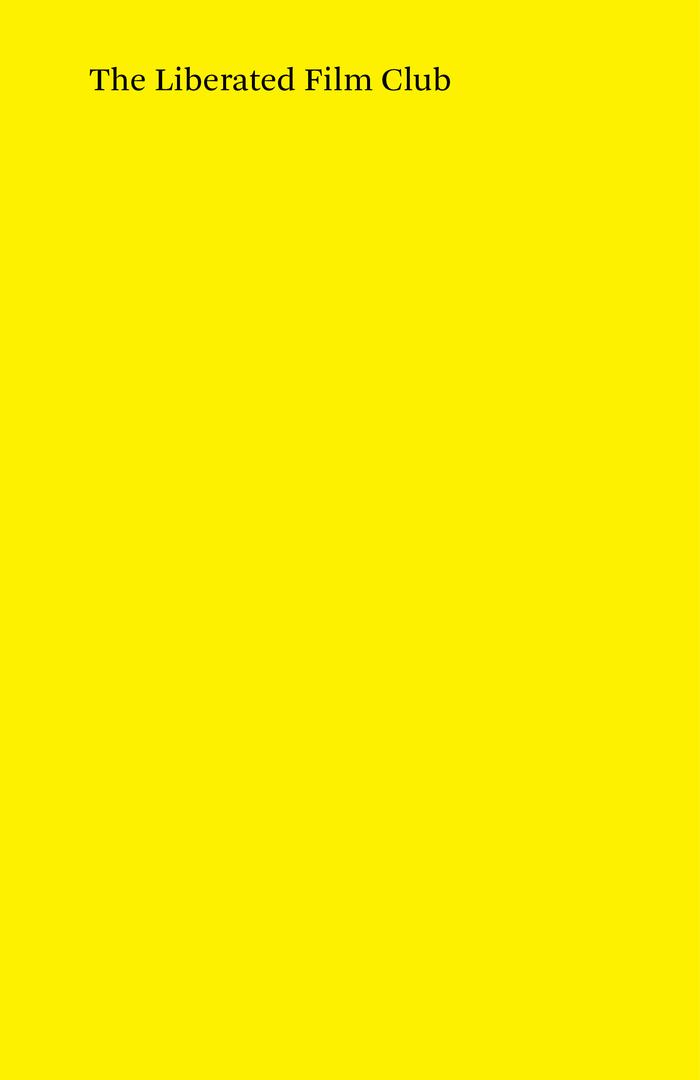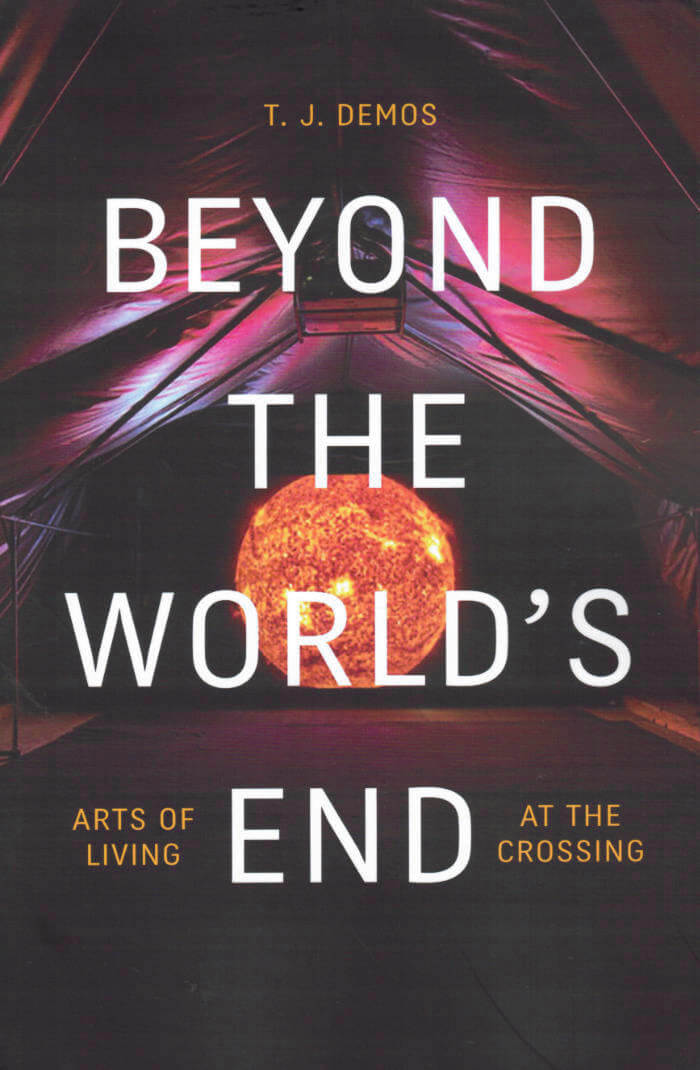John Akomfrah
John Akomfrah

Issue 9: John Akomfrah
This special, limited-edition issue of Plaster celebrates Akomfrah’s commission for the British Pavilion at the 60th International Art Exhibition, La Biennale di Venezia. The linen presentation box contains: an essay by Akomfrah’s long-time friend and collaborator, the BAFTA-winning film curator June Givanni; an interview with Akomfrah by Harriet Lloyd-Smith; original portraits by photographer Siam Coy and a fold-out poster featuring an exclusive still from Akomfrah’s film installation, Listening All Night To The Rain, now screening in the British Pavilion at the Venice Biennale.
With creative direction by Constantine // Spence and design by Emma Ralph.

A Space of Empathy
An overview of John Akomfrah's work, with contributions by Julia Grosse and Nelly Y. Pinkrah, an interview with the artist, along with a foreword by Sebastian Baden.
John Akomfrah creates thoughtful video works of haunting audiovisual intensity. He tells of the radical changes and crises of the present and past on characteristic large-format screens. From November 9, 2023 to January 28, 2024, the Schirn Kunsthalle Frankfurt is presenting for the first time a comprehensive overview of the artist's work in Germany, featuring a selection of three major multichannel installations from recent years: The Unfinished Conversation (2012), Vertigo Sea (2015), and Akomfrah's new work, Becoming Wind (2023). A co-founder of the influential London-based Black Audio Film Collective (established in 1982), Akomfrah's work interweaves newly shot film sequences with archival material to create multilayered, at times associative collages, frequently in the form of simultaneous narrative structures.
Akomfrah's immersive installations critically examine colonial pasts, global migration, and the climate crisis. He addresses one-dimensional historical representations by allowing multiple perspectives to emerge in the narrative, disrupting the notion of linearity and the illusion of a one and only truth.
Published on the occasion of the eponymous exhibition at Schirn Kunsthalle Frankfurt in 2023-2024.
John Akomfrah (born 1957) is a British artist, writer, film director, screenwriter, theorist and curator. His works are characterised by their investigations into memory, post-colonialism, cultural identity, temporality and aesthetics and often explores the experiences of migrant diasporas globally. Akomfrah was a founding member of the influential Black Audio Film Collective, which started in London in 1982 alongside the artists David Lawson and Lina Gopaul, who he still collaborates with today.
And more

The Liberated Film Club
The Liberated Film Club—running from its birth to its death, 2016 to 2020—would guarantee a wide wing-span for critical conversation. Screening “Liberated film” (a loose category designed to scaffold the show), a guest would be invited to introduce a film; an audience seated to watch it through; but there’d be an interruption to that typical format. Neither the audience nor the guest would have any idea what film would be shown, and this anonymised format would invite broad and antagonistic perambulation on the what, the why and the how of film.
An interrogation of what we do when we sit in a cinema; a reckoning with the kind of posture we should assume when we frame a film for further talk. Playing with the various ways we should consider and reproach the institutions built around all of our cultures of making and the manners and methods of all of our cultures of consumption, the Liberated Film Club was a rare reflection on the act of reflection itself.
An anthology publication,
featuring contributions from
John Akomfrah;
Chloe Aridjis;
Dennis Cooper;
Laura Mulvey;
Chris Petit;
Mania Akbari;
Elena Gorfinkel;
Juliet Jacques;
Ben Rivers;
Dan Fox;
Sean Price Williams;
Adam Christensen;
Stewart Home;
Stephen Watts;
Tony Grisoni;
Gideon Koppel;
Astra Taylor;
Miranda Pennell;
Gareth Evans;
Adam Roberts;
Tai Shani;
Anna Thew;
Xiaolu Guo;
Andrea Luka Zimmerman;
William Fowler;
Athina Tsangari;
John Rogers;
Shama Khanna;
Shezad Dawood;
Damien Sanville;
& Stanley (& Winstanley) Schtinter.
(Eds.) Stanley Schtinter,
with Dominic J. Jaeckle
& Jon Auman

Living with Ghosts: A Reader
Living With Ghosts explores the ways the unresolved traumas of Africa’s colonial past, and its unfulfilled project of decolonisation, continue to haunt the present global order. The reader further expands on these complex ideas through philosophical, historical, and literary approaches. Reprinted texts by thinkers such as Achille Mbembe, C.L.R. James, and Sabelo J. Ndlovu-Gatsheni explore the historical experiences of the African postcolony and the problematics of decolonisation. Meditations on artists including John Akomfrah and Abraham Oghobase provide engaging entry points to their multi-layered artistic practices. Also featured are images of artworks in the exhibition and an in-depth conversation between Bouchra Khalili and KJ Abudu.
Texts by Achille Mbembe, Jacques Derrida, C.L.R. James, Sabelo J. Ndlovu-Gatsheni, KJ Abudu, Emmanuel Iduma, Walter D. Mignolo, Avery F. Gordon, Adjoa Armah, Joshua Segun-Lean. Conversation with Bouchra Khalili and KJ Abudu.

Beyond the World's End
In Beyond the World's End T. J. Demos explores cultural practices that provide radical propositions for living in a world beset by environmental and political crises.
Rethinking relationships between aesthetics and an expanded political ecology that foregrounds just futurity, Demos examines how contemporary artists are diversely addressing urgent themes, including John Akomfrah's cinematic entanglements of racial capitalism with current environmental threats, the visual politics of climate refugees in work by Forensic Architecture and Teddy Cruz and Fonna Forman, and moving images of Afrofuturist climate justice in projects by Arthur Jafa and Martine Syms.
Demos considers video and mixed-media art that responds to resource extraction in works by Angela Melitopoulos, Allora & Calzadilla, and Ursula Biemann, as well as the multispecies ecologies of Terike Haapoja and Public Studio. Throughout Demos contends that contemporary intersections of aesthetics and politics, as exemplified in the Standing Rock #NoDAPL campaign and the Zad's autonomous zone in France, are creating the imaginaries that will be crucial to building a socially just and flourishing future.